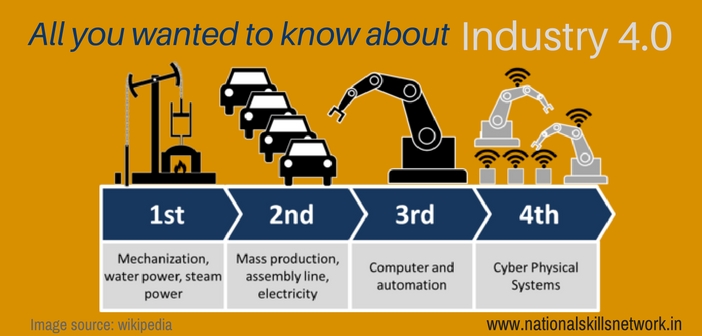Let’s talk about skills for industry 4.0. Digital technologies are rapidly transforming the manufacturing sector and we are already into Industry 4.0. Today, every company is a potential digital enterprise. This is a critical phase in industrial evolution marked by computers, mobile devices, internet connectivity, data, robotics, 3D technologies, augmented reality, cloud computing and a host of other developments that are shaping the new age workplace skills in the manufacturing sector.
Unlike the popular perception of manufacturing as labour-intensive, Industry 4.0 is skill-intensive and demands a variety of skills even at the lowest level in the skill spectrum. Let’s look at the skills required for productivity enhancement (efficiency and reduction of wastage) and capacity building (through training and matching of skills and talent).
”All you wanted to know about…” is a knowledge series on skill development and employment brought to you by LabourNet Services India Pvt Ltd, an NSDC partner, in collaboration with National Skills Network (NSN).

Highlights of Industry 4.0
Industry 4.0 is all about digitization of the manufacturing sector through the following
- The astonishing rise in data volumes, computational power, and connectivity, especially new low-power wide-area network
- The emergence of analytics and business-intelligence capability
- New forms of human-machine interaction such as touch interfaces and augmented-reality systems
- Improvements in transferring digital instructions to the physical world, such as advanced robotics and 3-D printing
(Source: McKinsey)
So, how do skills impact productivity and efficiency in the evolving industrial production sytems? With ‘digital’ being the keyword what are the most needed skills for employment and employability? How will Industry 4.0 affect MSMEs that drive 38% of our GDP and employ more than 110 millions? Answers to the above questions will depend on how fast we embrace digital technology and make it an integral part of all skilling programs for the success of digital enterprises.
At the end of this transformation process, successful industrial companies will become true digital enterprises, with physical products at the core, augmented by digital interfaces and data-based, innovative services. These digital enterprises will work together with customers and suppliers in industrial digital ecosystems.
(Source: Global industry survey 4.0, PWC)
Higher productivity and efficiency through automation and robotics
Digital production line skills
Let’s take an example from the services industry. Look at the way digital and mobile technologies have transformed services like cabs drivers and home delivery and positively impacted the automotive and logistics industry respectively. The Ola cab driver or the Amazon delivery person have adapted to using mobile and handheld devices as an integral part of their profession. Today, skills like understanding GPS coordinates, using tracking systems are basic to enter into these jobs.
Now, lets come to the manufacturing industry. Automation and robotics have transformed the way vehicles or medicines are made. It has not only brought in efficiency but also reduced risks, human errors, health hazards while increasing safety of the worker and productivity. Today, skills like guiding a robot or operating a simulated assembly line are basic to jobs in most manufacturing sectors.
This calls for several production line skills in operations ,monitoring, coordination, quality control, time management in addition to knowledge of raw materials, production processes and techniques and so on.
Analytical and predictive skills
The manufacturing industry is undergoing radical changes with the digitization of various essential functions. There is a huge amount of data generated by computerized production systems. And most products in B2B (industrial machinery and digital gadgets) or B2C (a washing machine or an AC) are sold in the market with a service component that adds the digital element to it.
As manufacturing and services come close and create an extended engagement with the customer, it is imperative that we re-look at analytical skills that form the core of digital enterprises.
Skills like attention to details, analytical thinking, problem solving, working with digital interfaces, information management through tracking and monitoring and so on are fundamental in getting and entry into industry 4.0.
Capacity building through proactive matching of skills and talent
The HR functions in many manufacturing units are finding innovative ways to control attrition and enhance employee engagement. Recruitment is being redefined as an end-to-end process beyond mapping of skills and competencies and definitely not a once time investment in training. It is highly beneficial both for the employer and the prospective employee to know their expectations and fitment for effective training and skill development initiatives that align with business goals.
Digital technologies are changing the face of recruitment and talent management through Augmented Reality, Simulations and virtual interventions to gauge the employee’s readiness to take up a job and strategies for talent retention.
Skills like using a tablet, mobile phone or a computer to take simulated recruitment test call for various sub-skills. These include basics of human-computer interaction, using touch screen interface, overcoming digital anxiety and digital phobia, playing digital games, performing simulated tasks and so on.
Apprehensions and misconceptions are bound to arise with every major paradigm shift in industrial evolution. Digitization cannot be equated with loss of jobs. It should be seen as the incorporation of new skills and advanced competencies that enhance the aspirational value of manufacturing jobs. Since our focus is on turning India into a global manufacturing hub into order to generate jobs and improve socioeconomic growth, it is all more important that digital skills become a compulsory component of any skilling project.













Assistance and requisition of business development partnership
In present time or future lots of demand of employee in analytical field. Government introduce analytical programs like data science big data under skill development program lots of engineering student got a good job.